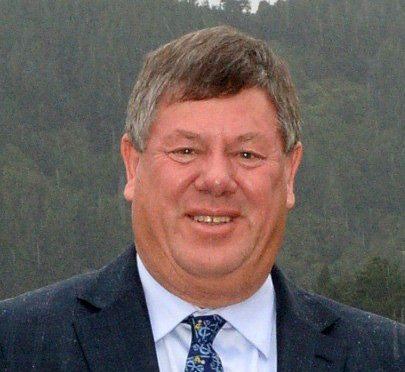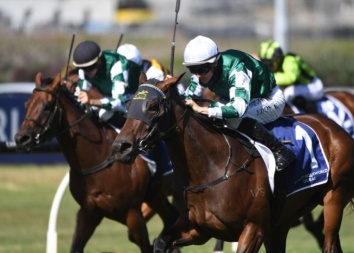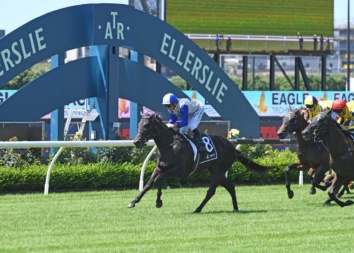Racing Minister miffed by reaction to budget tax relief

Story by Brian de Lore / The Informant
Racing Minister Winston Peters voiced his displeasure – albeit with a little mirth – at the vitriol displayed by the political minority in both the racing industry and general media after the tax relief for racing was announced in last week’s budget.
“The racing industry has to show a bit of patience,” Peters said in a call from Tokyo Airport to The Informant last Sunday. “They waited nine years and got nothing from the National Party and I’m trying to put together some changes and that one in the budget is just the start of something for the breeding industry.”
Peters had flown out to Japan on foreign affairs business immediately following the budget announcement and was waiting to board his flight for the return journey when he found time to make the call.
“I have to get on with the job but I’m not here to make friends, only to fix things up.”
Channel Three’s Newshub had earlier described the racing tax relief given by the Minister as a “concession for his racing mates” – perhaps a borrowed quote from National Party leader Simon Bridges – while some racing industry people from the right-hand side of the political spectrum took their usual stance in opposition to any announcement from Peters.
“If there are people who are critical of this tax reform – do they prefer nothing? I have to get on with the job but I’m not here to make friends, only to fix things up,” replied Peters in reference to the dissenters.
It’s a fact that Peters will be criticised whatever changes he makes for racing, but that’s because he both polarises the political spectrum and in a forum like the 2018 budget, the racing industry was again fuelled-up with high expectation.
This budget announcement brought shock-horror from those anticipating a free hand-out from government coffers. With that came the barbs flying in all directions but for a battle-hardened politician like Peters it was water off a duck’s back.
When speaking to the Minister in Tokyo he was in a buoyant mood and not particularly perturbed by the flack: “The next one is about all-weather tracks but the structure of the racing industry is being investigated and reviewed by John Messara, so I have to wait upon that before I can say any more, and from which the legislation will be derived,” continued Peters.
“That’s the sequence and I can’t go any faster. I can’t say anything that might pre-empt his report or what the report concludes, but what I can say is this tax reform is what was put in place back in 2006 and was accepted for a few years and then when a new Minister of Revenue came along they changed it all.
“So all I’m doing here is changing it back which I have done and that’s only the beginning of that structure. On that occasion, it was sabotaged by the National Government but this time we are going to push the boat out again and make sure no-one sabotages it.
“Whatever John (Messara) might have in his report, the fundamentals of a fair tax policy have to be put in place no matter what, so I can say that now.”
New Zealand Thoroughbred Breeders’ Association president John Fokerd has been working on this tax issue for some time, along with a change in attitude towards racing from the Inland Revenue Department.
“All this tax relief was doing was fixing up an inequity between new breeders and established breeders,” Fokerd told The Informant this week. “Nothing has happened around any major tax reform at this stage but we are hoping it will happen.”
Fokerd, who worked for the introduction of reform for more than three years alongside former TBA CEO Michael Martin and with tax accountants such as John Aubrey, Rob Braithwaite and David Patterson, says the grey areas in racing taxation have to be sorted out, and this is only the start of it.
“This is more of a technical thing because it was tested in court and we haven’t really been able to give advice to potential investors about tax issues since. The breeders have spent years sitting down with IRD trying to go through all the different tax laws around bloodstock to get an agreement.
“This was an issue that stood out that we couldn’t agree on. The IRD wasn’t prepared to go back on something they won in a tax case which became a precedent, and they were sticking with that belief.
“This tax change is very minor and is only reinstating something we used to have and then lost in that tax case. The tax law was never actually changed; it was just that the IRD took a different interpretation of it.”
Fokerd also admits the change will benefit very few people but the implications of the reform are very important for other reasons. “This is to encourage people to come in at the high end of the market and get a deduction straight away.
“To me, the key is to try and keep those horses in New Zealand so potentially we might get one or two future stallions. It’s really opening up an opportunity to a few, new people. It’s not a big number and we are talking, only high-quality horses.
“It’s very expensive to go and buy stallions overseas and if we can encourage the home-grown product and get new people involved, that’s a good alternative in my mind.”
One person happy about the change is Te Akau Syndications boss David Ellis who commented: “When the last Labour government was in, Michael Cullen increased depreciation rates to encourage fresh investment in racing – the work of Minister Peters in 2006.
“That was a big one because we had been losing our gene pool so rapidly – even then. By way of example, of the last 22 black-type filly winners we have had, 19 have been sold to Australia which is heart-breaking for our future breeding.
“What we need is fresh investment and so increasing the depreciation rates is a big help. In 2006 Peters increased the rates to encourage new investment. But once National came back into power the IRD saw it differently and said the business of a breeding investment doesn’t start until the horse goes to stud.”
Long-time industry stalwart John Aubrey, who has been looking at accountancy issues in racing and breeding for most of his working life, had this to say about last week’s budget: “The style of the policy was out of the hands of the industry. It was the Inland Revenue’s own approach to it.
“I haven’t had much involvement since last July. We struck the IRD’s stubbornness but in the end they did relent – they originally thought this change would cost them $50 million a year– I think the ceiling of $4.8 million they have put on it is just ridiculous. Talking to John Fokerd he’s hoping the opening shots will be a lot more practical.”
The opening shots are the wording the IRD has used, which Aubrey explained: “The hope is that when it comes through it has a lot more common-sense to it in the wording – and also they need to consult the industry on the practicality of it.
“The IRD came out with that terminology of standout and quality,” said Fokerd, “whereas we originally said high-priced – we spent a lot of time trying to explain that but they have a very different view of the industry.”
Fokerd sees this as just a small victory but he but he is very optimistic about what lies ahead with further big changes coming: “The next key support for us will be the Messara Report and what comes out of that and how much the Minister can implement,” he enthused.
“NZ First picked up this one first because they say saw it as unjust. This is only minor compared to the implications of the Messara report and potential for increased prize-money which will benefit everyone. We now have the platform for change and that’s what we want.
“The industry can’t keep going the way it is – there has to be change and rationalisation and the industry has to be a lot more efficient.”
Peters is unapologetic and unchanged about his planning of the order of events: “I’m dealing with what I can deal with now, ahead of the Messara report, which will only be a couple of months away and that’s where things currently stand.
“The report will come much more quickly than most reports do, and it will be substantial in my view, and I’m happy to wait for it and be confident that I’m going to get the right answers.
“If people are saying they don’t like what’s happening then my response would be, ‘really, but what did you have before – sitting on the side-lines and whinging is not going to help you, and taking pot shots and not saying it to my face is not a good idea.’ ”
Peters again confirmed the roll-out of legislative change through the Racing Act can only happen periodically, which places proposed racefields legislation on hold and will only be finalised subject to the Messara report.
And while overseas on foreign affairs matters, racing is never far from Peters’ mind. He recently inspected an artificial track in England and spoke to a number of experts in that field, and when in China next week he will be meeting people with major racing interests.
“There is a coming market there for us and while it’s not ready to happen yet I have my team working on it, and we want to be first in the queue and have something to look forward to,” concluded Peters.
To read this and other important industry stories in The Informant each week email ADMIN@RACINGMEDIA.CO.NZ. Mention W@W and get 20% off an online subscription.

Ocean Park Fillies Dominate G1 NZ Oaks
Racing in the silks of Yulong Investments, Saturday’s G1 Al Basti Equiworld Dubai New Zealand Oaks (2400m) was a coup for the international breeding and racing venture as OCEAN PARK fillies Ohope Wins and Autumn Glory …
Read More
Consecutive G3 Victories For Savabeel’s Belle Cheval
With the $4 million NZB Kiwi (1500m) next on the agenda for Mark Walker and Sam Bergerson’s Belle Cheval, the 3yo SAVABEEL filly could not be in better form, adding Saturday’s G3 Uncle Remus Stakes …
Read More